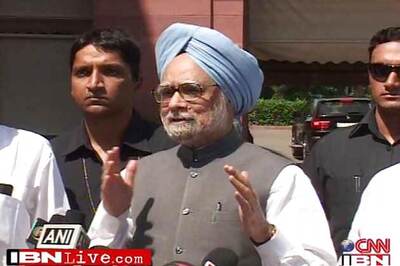
views
Chattisgarh Chief Minister Raman Singh is considered a deft political manager. His skills have been put to real test this assembly polls in the state.
A seasoned leader that he is, multiple variables in elections have brought in an element of uncertainty on the poll outcome which in many ways will make or break the myth that “an election can be managed to victory” and that BJP is a master of that art.
As early as in January 2018, the Raman Singh government had started pouring huge amounts of money into advertisements as it was aware of the anti-incumbency sentiment in the state.
This was amplified by the anger of farmers because the promise of Rs 300 per quintal bonus scheme and MSP of Rs 2,100 were not kept, and Congress under the leadership of Bhupesh Baghel, who himself is a farmer, made it a big issue.
The Modi government’s twin shocks of GST and demonetisation also annoyed the trader and business community, who formed the traditional support base of the BJP.
Although the BJP boasted of 10% GDP growth during Raman Singh’s 15-year rule, the benefits of the said growth remained confined to a limited section of the society as it was mainly propped up by mining, power and steel industries.
These sectors generate fewer jobs as compared but thousands of acres of farm land was acquired for these projects. Unemployment among youth was also a big issue and the policy of giving jobs to outsiders was seen as deliberate by a government whose CM and top ministers face allegations of being a “Baahari” (non-local).
Aware of all this, BJP came up with the Vikas Yatra programme to canvas the government’s achievements. It was designed to secure political benefit by using public money.
Under this two-phase programme, the CM toured every constituency and held at least 300 public meetings in a span of about 80 days. The entire government machinery worked as political workers. The Congress launched a sharp attack on the misuse of public funds.
But did the political benefits that the BJP desired to derive out of the yatra did not materialise? The jury is still out in that.
The party had another weapon – a “vote katwa” in the form of Ajit Jogi. Jogi’s alliance with Mayawati’s BSP played into the hands of the BJP as it would cut the Dalit votes which have traditionally gone to the Congress.
This alliance ought to have paved the way for a smooth sailing for BJP in at least 25-30 seats, but the political managers in the party failed to realise that Congress could also snatch a chunk of OBC/farmer base once the tag of pro-Dalit party is gone.
The social equation on ground in Chhattisgarh has always been of OBC vs SC. The field reports from Mahanadi basin suggest that while Dalits have moved away from Congress to Jogi BSP alliance, a chunk of OBC voters have also shifted their loyalty from BJP to Congress making for an interesting triangular contest.
Distribution of tickets by Jogi, who is looking to follow Kumaraswamy’s method of taking the CM’s seat, also hurt the BJP as he fielded candidates who could hurt the party in some seats.
Amid all this, the role of Election Commission has also been put to test as despite the imposition of Model Code of Conduct, many news reports appeared about BJP leaders distributing articles like mobiles, tiffin boxes, shaving kits etc under government schemes.
Although the free run actually suited all parties, BJP was the major beneficiary as it had more resources than the others.
Reports of names of voters of particular communities, which are more likely to vote against BJP, being dropped also surfaced. Though the voting remained largely peaceful, there were several instances of EVMs and VVPAT machines malfunctioning.
In Nawagarh constituency, a BJP Minister was allowed to perform a Puja at the polling booth. A video of the incident went viral. The media outcry forced ECI to take action on this incident and now two government officers have been suspended, but many other small incidents have gone unreported.
As a desperate move, BJP also tried to reach out to every influential person in constituencies and assigned jobs to so called “Panna Prabharis”. In every constituency, about 100 persons were not directly related to BJP were identified and made to work for the party. Many of them, however, refused to fall in line.
In a nutshell, the BJP’s entire fortune hangs on the capacity of Jogi-Mayawati alliance to divide the Congress votes and hope they retain most of their own core voters. But it would not be an easy task. More than management, the party needs a huge amount of luck on its side.
The author is a lawyer and a political observer. Views expressed are personal.




















Comments
0 comment